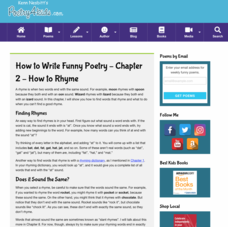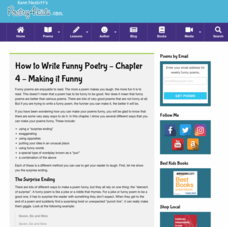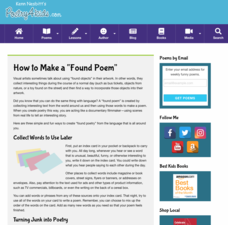Poetry4kids
How to Host an Open Mic Poetry Party
Four steps to Open Mic Night! The location, invitations, supplies, and party favors are all part of the process in planning and hosting a fun-filled gathering where scholars read aloud an original poem or one by their favorite author.
Poetry4kids
How to Write a Repetition Poem
A repetition poem is the focus of a lesson that challenges scholars to compose an original piece. To add meaning to their poem, authors choose words to repeat at the start of most lines.
National Council of Teachers of English
Writing Poetry with Rebus and Rhyme
Young scholars write rhyming poems using rebus. With pictures instead of words, authors create original work about things they love.
Poetry4kids
How to Write a “Favorite Things” List Poem
If your students made a list of their favorite things, would writing poetry be on it? After this poetry writing lesson, it might! Young writers make a list of what they like—or what they don't like—before crafting the list into a rhyming...
Poetry4kids
How to Write an Exaggeration Poem
The best poetry writing lesson of all time is here for you! Learn all about the art of exaggeration with a lesson on exaggeration poems, which instructs students to use wild imagery to convey their message.
Poetry4kids
How to Write a “Backward” Poem
If you like poetry, wait till you try backward poetry! Young writers read Shel Silverstein's "Backward Bill" before writing their own funny poems that are full of backward imagery and phrasing.
Poetry4kids
How to Write a Tanka Poem
Take your haikus to the next level with tanka poems, another form of Japanese poetry that regulates the length and rhythm of each line by syllables. Young writers read the explanation, examples, and tips for tanka poems before writing...
Poetry4kids
How to Write a Clerihew
Writing funny poems is the best part about learning poetic forms! Young poets learn all about clerihews—humorous four-line poems about people—with an explanatory lesson.
Poetry4kids
How to Write a Fractured Nursery Rhyme
Scholars take a popular song or nursery rhyme and make it their own as they write a fractured nursery rhyme. Writers seek out a nursery rhyme's rhyming words and change them to create an original poem.
Poetry4kids
How to Write a Tongue Twister
Betty Botter and Theophilus Thistle provide models for willy writers to wrestle words into tricky tongue twisters.
Poetry4kids
Evoking the Senses in a Poem
Budding poets choose a topic for a sensory-filled poem. Authors describe that topic using detailed language based on the five senses. Then, switch the senses to create a fanciful poem intended to add a touch of fun to the objective.
Poetry4kids
Rhyme Schemes Lesson Plan
Scholars read four brief poems and analyze their word usage in order to identify the rhyme scheme.
Poetry4kids
How to Write an Apology Poem
Put a silly spin on making amends with an apology poem. Budding poets think of a time they were made to apologize although they didn't mean it. They then turn their experience into a poem that offers details and ends with an explanation...
Poetry4kids
How to Create Book Spine Poetry
Can you create a poem without writing a word! With found poetry, you can! Practice one version of found poetry with a lesson on book spine poems. Learners create poems by stacking books and reading the lines created by their spine titles.
Poetry4kids
How to Write Funny Poetry — Chapter 2: How to Rhyme
Funny poems don't have to rhyme—but it helps! Learn how to use rhyming words to add humor to funny, clever, or just plain silly poems.
Poetry4kids
How to Write Funny Poetry — Chapter 4: Making It Funny
You've got your topic—now how do you make your poem funny? Explore ways to make a poem humorous, including puns, exaggeration, silly words, and surprising endings, with a helpful poetry lesson.
Poetry4kids
How to Write Funny Poetry — Chapter 3: Choosing a Topic
Nothing's better than a really funny poem! Help young writers craft their funny poems with a lesson on one of the most challenging parts of writing: picking what to write about.
BBC
Tales of Hans Christian Andersen
Fairy tales seem like quick, fun children's stories, but asking compelling questions about characters, plot elements, and literary themes can transform them into rich and complex tales. Use a series of eight lessons on Hans Christian...
K12 Reader
Spelling Rule Exceptions for Plural Nouns: Words That End in S
Plural nouns end in -s, but what do you do if a singular noun already ends with -s? Young grammarians practice the exception to the plural rule by adding -es to 20 nouns.
Poetry4kids
How to Write a Limerick
Add a little fun and fancy to English language arts with an activity that challenges scholars to write a limerick. Authors follow five rules in order to compose an original poem that contains a specific rhyme scheme.
Poetry4kids
How to Create a “Found Poem”
Writers compose an original found poem by searching for words that inspire them. Words are taken from everyday conversation, books, cut from magazines, the mail, or an already written poem.
Poetry4kids
Rhythm in Poetry: The Basics
What makes a great poem sound so good? Learn the rhythmic secrets of poetry with an explanatory online lesson.
K12 Reader
Spelling Rule Exceptions for Plural Nouns: Words That End in F and EF
Is it giraffes or giravves? Practice changing 20 singular nouns to plural nouns with a helpful grammar worksheet.
Poetry4kids
How to Write Funny Poetry — Chapter 1: Writing Poetry
Do you wish you could write poetry that makes people laugh? Now you can! Check out the first chapter in a poetry writing series that emphasizes the importance of connecting subject matter to a light, bouncy meter.

























